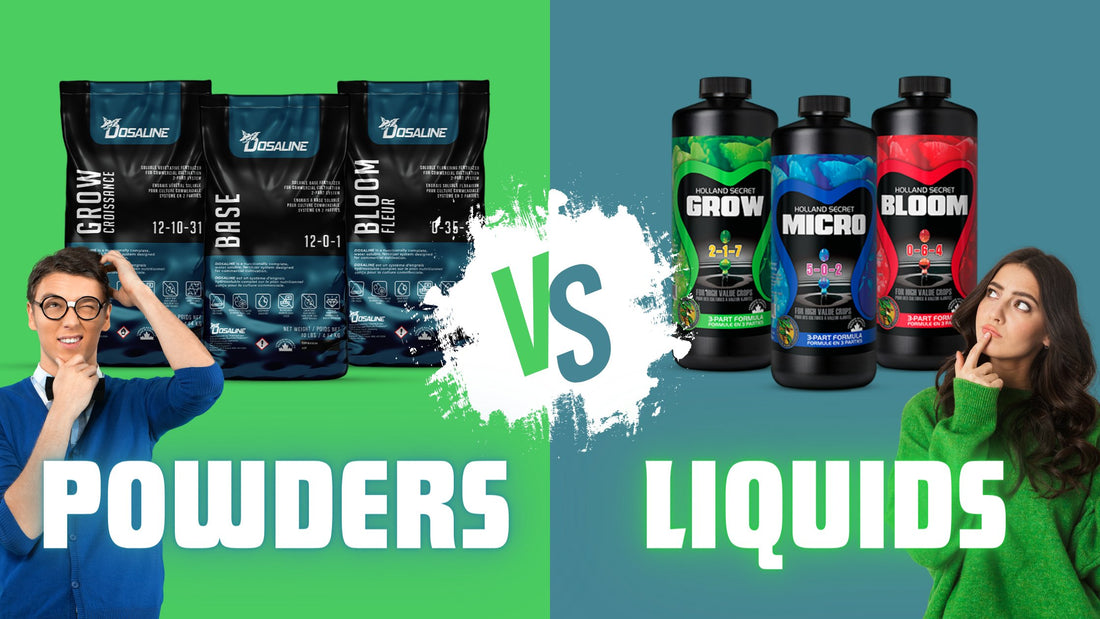Liquids vs. Powders: Choosing the Best Hydroponic Fertilizer

Hydroponic growing has gained popularity for its efficient use of resources and ability to produce high-quality crops. When it comes to hydroponic fertilizers, there are two primary options: liquid and powder. Each type has its own set of advantages and considerations, making the choice between them an important decision for both commercial and recreational growers.
Liquid Fertilizers: The Convenient Solution

Composition: Liquid hydroponic fertilizers, like Holland Secret (Grow/Micro/Bloom), come pre-dissolved and ready for immediate use. They contain a well-balanced mix of essential nutrients in a soluble form, including nitrogen (N), phosphorus (P), potassium (K), and various micronutrients.
Ease of Use: Many recreational growers find liquid fertilizers easy to use. Simply mix the appropriate amount with water and feed the nutrient solution to your plants. Holland Secret even provides a convenient feed schedule to ensure accurate dilutions.
Nutrient Availability: Liquid fertilizers are quickly absorbed by plants due to their soluble form, promoting faster nutrient uptake and potentially quicker growth and development.
Shelf Life: One drawback is that liquid fertilizers may have a shorter shelf life compared to their powdered counterparts. They can be prone to nutrient precipitation if not stored correctly.
Cost and Storage: While they can be more expensive per unit of nutrient content, liquid fertilizers are convenient and easy to store.
Customization: Some liquid fertilizers come pre-formulated for specific growth stages, while others can be customized by adjusting the concentration in the nutrient solution.
Powder Fertilizers: Tailored for Efficiency

Composition: Products like Dosaline Base, Grow & Bloom, tailored towards commercial growing but also used by recreational growers, come in a dry, powdered form. They contain the same essential nutrients as liquid fertilizers.
Ease of Use: Dosaline products require dissolving in water to create a hydroponic solution. Proper mixing is essential to ensure even nutrient distribution, but this is easily achieved when following recommended dilution guidelines.
Nutrient Availability: Powder fertilizers need to dissolve in water before plants can absorb the nutrients, which can take some time. However, with proper mixing, nutrient distribution can be uniform.
Shelf Life: Powder fertilizers generally have a longer shelf life since they are in a dry form and less susceptible to degradation over time.
Cost and Storage: Powder fertilizers are often more cost-effective in terms of nutrient content, but they do require proper storage to prevent clumping and moisture absorption.
Customization: Powder fertilizers offer greater flexibility for customization as growers can precisely control the nutrient concentration in the solution.
Why Choose Dosaline for Commercial Growing?
Dosaline fine-powder fertilizers have rapidly gained traction in the world of commercial agriculture, becoming a staple for many growers. Their unique formulation and physical properties offer a myriad of benefits that traditional fertilizers might not provide. Here are some of the key advantages that make Dosaline fine-powder fertilizers a top choice for commercial growing operations:
-
Cost-Effectiveness: Dosaline is a cost-effective choice for large-scale operations, and it doesn't require large liquid storage containers, saving valuable space.
-
Storage Stability: Dosaline is stable for prolonged periods without concerns about nutrient precipitation or microbial degradation.
-
Customization: Dry fertilizers allow for precise customization of nutrient formulations and concentrations, catering to specific crop needs.
-
Ease of Transportation: Powder fertilizers are compact and lightweight, reducing transportation costs for bulk quantities.
-
Reduced Shipping Costs: Lower weight and volume translate to reduced shipping expenses, especially for growers sourcing from distant suppliers.
-
Reduced Handling and Mixing Costs: Handling and mixing powder fertilizers is often more straightforward and cost-effective, particularly for larger volumes.
-
Reduced Risk of Clogging: Powder fertilizers pose less risk of clogging hydroponic systems and irrigation equipment.
-
Longer Application Intervals: They require less frequent application, resulting in reduced labor and resource costs.
Dosaline stands out as a premier choice for commercial growers, offering a myriad of advantages that set it apart from the competition. Its fine-powder consistency ensures swift dilution while preserving the integrity of its nutrient content. For commercial ventures, Dosaline's cost-effectiveness is paramount, providing the ability to fine-tune nutrient profiles for optimal plant growth. Its long shelf life and resistance to degradation mean that growers can rely on its consistent quality over time. The compact and lightweight nature of Dosaline not only minimizes transportation and storage expenses but also makes it a pragmatic option for expansive operations. In an industry where efficiency and adaptability are key, Dosaline's powdered fertilizer emerges as an indispensable asset for achieving high-yield cultivation.
Choosing What's Best for Your Hydroponic Operation

Ultimately, the choice between liquid and powdered fertilizers depends on your unique circumstances. Consider factors like your scale of operation, crop requirements, budget constraints, and available infrastructure for nutrient management. Some growers even use a combination of both types to optimize their hydroponic systems.
Whether you opt for the convenience of liquid fertilizers like Holland Secret or the efficiency of Dosaline's powder fertilizers, careful consideration will ensure your hydroponic crops receive the nutrients they need for robust growth and abundant yields. Happy growing!
